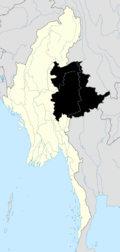Mobye
Geography
Mobye is located on the border with Kayah State, 10 miles northwest of its the Kayah capital Loikaw. The village tract is connected to Pekon, the township's principal town, and Loikaw through waterways, railways and a roadway.
The Mobye Dam, located within the village, is built along the Pilu River (also called the Baluchaung River). Together with the Lawpita Dam, the dams power the Lawpita Power Plant system. The Mobye dam began construction in 1969 with the first of the two hydropower stations along the Pilu River completing in 1974. During this period, 8000 people were forced to relocate away from the reservoir area. The construction of the two dams in 1992 was conducted by the Myanmar Army and displaced over 12,000 people and created severe negative social and ecological impacts in the area.
History
Mobye was formerly the capital of Mongpai, a Shan state. It belonged to the Central Division of the Southern Shan States.
During the 2021 Myanmar civil war, Mobye was the site of several battles. Due to its proximity to Loikaw, Mobye was the site of skirmishes during the 2021 Battle of Loikaw. Battles between junta troops and the Mobye PDF along roads and villages leading to Loikaw. Additionally, there were firefights in the village tract throughout the aftermath of the 2022 Battle of Loikaw. During the course of Operation 1111, the Karenni Nationalities Defense Force seized control of the town during spillover clashes from fighting in Loikaw.
Demographics
| Year | Mobye Village Tract | ±% |
|---|---|---|
| 2018 | 27,798 | — |
| 2019 | 28,287 | +1.8% |
| Source: | ||
There are several ethnic groups within the area, including, Kayan, Shan, Bamar, Karenni and Intha people.
References
- ^ Myanmar Information Management Unit (September 2019). Pekon Myone Daethasaingyarachatlatmya ဖယ်ခုံမြို့နယ် ဒေသဆိုင်ရာအချက်လက်များ [Pekon Township Regional Information] (PDF) (Report). MIMU.
- ^ Karenni Development Research Group (2006). Dammed by Burma's Generals: The Karenni Experience with Hydropower Development - from Lawpita to the Salween. University of California, Berkeley. ISBN 9781899235964.
- ^ Middleton, Carl; Lamb, Vanessa. Hydropower politics and conflict on the Salween river (Report). Knowing the Salween River: Resource politics of a contested transboundary river. Vol. 27. p. 37.
- ^ Scott, James George; Hardiman, John Percy (1899). Gazetteer of Upper Burma and the Shan States. superintendent, Government printing, Burma.
- ^ "မိုးဗြဲ၊ လွိုင်ကော်နဲ့ ဒီမော့ဆို မြို့နယ်တွေမှာ တိုက်ပွဲဖြစ်ပွား". ဗွီအိုအေ (in Burmese). Retrieved 2023-04-19.
- ^ Irrawaddy, The (8 June 2022). "မိုးဗြဲသို့ တက်လာသည့် စစ်ကောင်စီစစ်ကြောင်း တိုက်ခိုက်ခံရပြီးနောက် ပြန်ဆုတ်သွား". ဧရာဝတီ. Retrieved 27 April 2023.
- ^ Wei, Brian (25 March 2024). "Myanmar's Junta is Nearing Its End in The Thai Border State of Karenni". The Irrawaddy.

